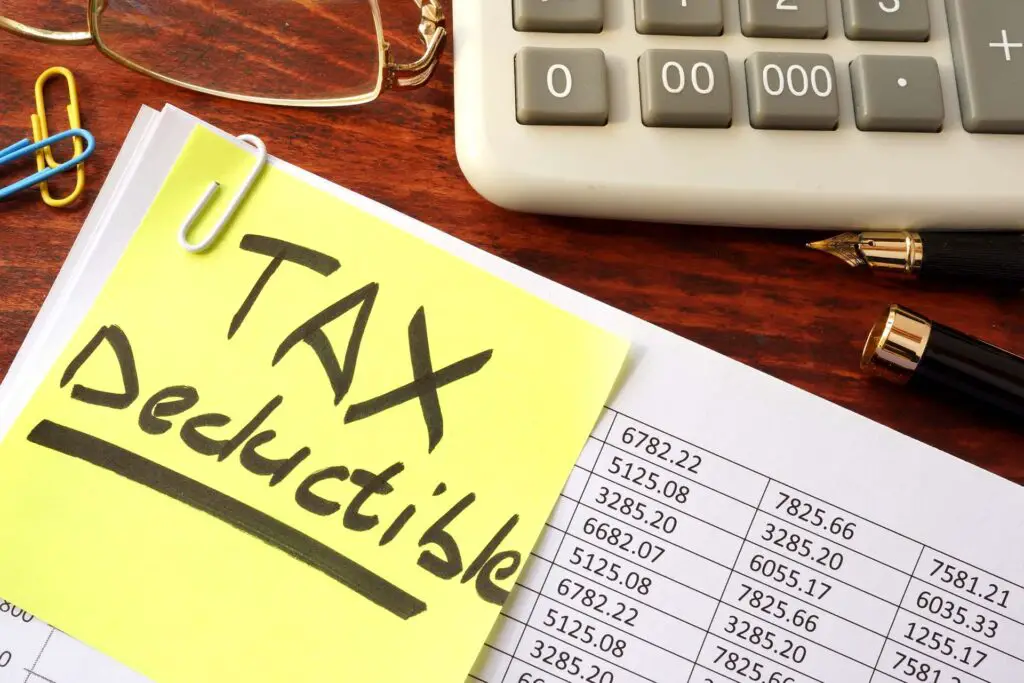One of the joys of driving your vehicle is knowing that you can make it look, feel, and perform exactly how you want it. Of course, as long as your pocketbook allows for it! But are car payments tax deductible? Also, did you know that ‘pocketbooks’ might include more than just cash? It could be possible to factor in tax deductions when figuring out those finance payments on a shiny new set of wheels.
Car payments may be tax deductible if considered necessary expenses for business purposes. Eligible expenses may include fuel costs, insurance premiums, repairs, and maintenance fees. However, personal car payments are generally not tax deductible unless the taxpayer meets certain eligibility criteria, such as driving for medical reasons or as part of a charitable organization.
Are Car Payments Tax Deductible?
If payments are essential for business purposes, they may qualify for reductions. This can include expenses like insurance premiums, fuel costs, maintenance, and repair fees. On the other hand, personal payments are usually not eligible for deductions unless the taxpayer satisfies specific criteria like driving for medical purposes or as part of a charitable organization.
As you can see, it’s crucial to differentiate between business and personal expenses and seek advice from a professional for further guidance on reductions linked to car payments.

What Is a Car Payment and How Does It Work?
A car payment is a monthly installment made by a borrower to a lender for the purpose of purchasing a vehicle. These typically consist of two parts – principal and interest. The principal is the amount of money borrowed to buy the vehicle, while the interest is the cost of borrowing the money.
When borrowers take out loans, they agree to make monthly installments for a specified term, typically ranging from 36 to 72 months. The borrower must repay the loan in full, including the principal and interest, by the end of the term. The monthly payment amount is determined by several factors, including the amount borrowed, the interest rate, and the length of the loan term.

How to Know if You Qualify for the Car Payment Tax Deduction?
Has your payment been weighing on you like a brick? If so, determining whether you qualify for a payment tax deduction may help you lighten the load. Find out if you qualify for a sweet ride of financial relief by understanding all about car payment deductions.
However, if this topic is completely new for you, be sure to check these steps below that will help you determine your eligibility:
- Determine the purpose of the vehicle – If the four-wheeler is used for business purposes, you may be eligible for a deduction. However, if it is used solely for personal purposes, it is generally not deductible.
- Identify eligible expenses – If you are using your machine for business purposes, you may be able to deduct expenses such as fuel costs, insurance premiums, repairs, maintenance fees, and other expenses directly related to business use. However, personal car payments are not tax deductible except in specific circumstances.
- Keep accurate records – If you are eligible for a car payment tax deduction, it is important to keep detailed records of all vehicle expenses, including receipts, mileage logs, and other documentation.
- Consult with a tax professional To determine your eligibility for a car payment tax deduction and ensure that you accurately report the expenses. It is advisable to consult with a professional. They can help you understand the tax implications of your vehicle expenses and guide you on how to claim any eligible deductions on your tax return.
Overall, determining your eligibility depends on several factors, and it is essential to keep accurate records and seek professional guidance to ensure that you are maximizing your deductions while minimizing your liabilities.

What Types of Expenses Are Covered Under the Tax Deduction?
The tax deduction for car expenses can be a significant benefit for individuals and businesses alike. However, it is important to understand what types of expenses are covered under this deduction to ensure that you accurately report your payments and maximize your tax deductions. Eligible expenses may include fuel costs, insurance premiums, repairs, and maintenance fees, among others.
Business vs. Personal Car Payments
Business and personal payments are distinct types of expenses with different tax implications. Check out the table below for understanding better of how both expenses work.
| Business Car Payments | Personal Car Payments | |
| Purpose | Used for business | Used for personal purpose |
| Tax Deductible | Yes | Generally, no, except for certain circumstances |
| Eligible Expenses | Fuel costs, insurance premiums, repairs, maintenance fees, and other expenses directly related to business use | None, except for certain circumstances |
| Documentation Required | Mileage logs, receipts, and other records to support the costs claimed | None required for tax purposes |
| Liability for Payment | Typically paid by the business or self-employed individual | Paid by the individual |
| Type of Loan Available | Commercial auto loan, equipment loan, or car lease | Personal auto loan or car lease |
| Repossession of Vehicle | Possible if reimbursements are not made | Possible if reimbursements are not made |
Circumstances Under Which Personal Car Payments May Be Tax Deductible
While personal payments are generally not tax deductible, there are certain circumstances under which a taxpayer may be able to claim a deduction. Here are some examples:
- Medical expenses – If a taxpayer uses their personal vehicle to receive medical treatment, they may be able to deduct the related costs as medical expenses on their tax return. However, the expenses must be above a certain percentage of the taxpayer’s adjusted gross income to be deductible.
- Charitable purposes – If a taxpayer uses their personal vehicle for charitable purposes, such as delivering meals to the elderly or driving for a charitable organization, they may be able to deduct the related expenses as a charitable donation on their tax return. However, the expenses must be directly related to the charitable work, and the taxpayer must have proper documentation to support the deduction.
- Moving expenses – If a taxpayer moves for work-related reasons, they may be able to deduct the related costs as moving expenses on their tax return. However, the move must be closely related to the start of work, and the distance from the old home to the new work location must meet certain criteria.
Eligibility Criteria for Deducting Business Car Payments on Taxes
To be eligible for deducting business car costs on taxes, the vehicle must be used for business purposes. In addition, the following criteria must be met:
- Ownership – The vehicle must be owned or leased by the taxpayer, and it must be used in the course of their business.
- Business use percentage – The vehicle must be used primarily for business purposes, with the business use percentage being more than 50%.
- Actual expenses or standard mileage rate – The taxpayer can choose to deduct actual expenses related to the business use of the vehicle or use the standard mileage rate provided by the IRS.
- Adequate record-keeping – The taxpayer must keep adequate records of all expenses related to the vehicle, including receipts, mileage logs, and other documentation.
- Depreciation – If the vehicle is owned and not leased, the taxpayer may also be able to claim depreciation on the vehicle as a business expense.
It is important to note that there are specific rules and limitations for each of these criteria, and taxpayers should consult with a tax professional to determine their eligibility for deductions related to business costs.

Pros and Cons of Taking Advantage of the Tax Deduction
Before I get to the clear table of all pros and cons, keep in mind that it is essential to consult with a tax professional and keep accurate records to ensure that you accurately report your car expenses and maximize your tax deductions.
This being said, let’s get to the pros and cons as I promised:
| Pros | Cons |
| Potential savings | Record-keeping can be time-consuming and tedious |
| Helps reduce the overall cost of vehicle ownership | Eligibility criteria can be complex |
| Encourages businesses to invest in cars for business use | Can be limited in the amount of tax savings |
| Can be an incentive for self-employed individuals to invest in their business | Can be misused if personal expenses are claimed as business expenses |
| Provides an opportunity to maximize deductions and minimize tax liabilities | Not all vehicle expenses are eligible for tax deductions |
Tips for Making Sure You Maximize Your Benefit From the Deduction
To ensure that you are getting the most out of the deduction, it is important to understand the rules and limitations that apply, as well as how to accurately report your car expenses. So let’s get to the super useful tips that helped me to ensure I got the most out of the deduction.
Keep Accurate Records
To maximize your tax deduction, keeping accurate records of all expenses related to your four-wheeler is important. This may include mileage logs, receipts, and other documentation.
Separate Business and Personal Expenses
Suppose you use your machine for both personal and business purposes. In that case, it is crucial to separate these expenses to ensure that you are accurately reporting your business expenses for tax purposes.
Know What Expenses Are Eligible
Familiarize yourself with the expenses that are eligible for the tax deduction. They may include fuel costs, insurance premiums, repairs, and maintenance fees, among others.
Be Aware of Limitations
Understand the specific rules and limitations that apply to each type of expense. For example, expenses related to commuting to and from work are generally not eligible for a tax deduction.
Consult with a Professional
To ensure that you are maximizing your tax deduction, it is advisable to consult with a professional. They can help you understand the tax implications of your car expenses and guide you on how to claim any eligible deductions on your tax return.
Common Mistakes to Avoid When It Comes to Claiming Car Payment Tax Deduction
It is important to avoid common mistakes that can lead to underreporting, overreporting, or inaccurately reporting your car expenses. Here are some you should avoid:
- Claiming personal expenses – One of the most common mistakes is claiming personal expenses as business ones. This can include claiming expenses for commuting to and from work, which is generally not tax deductible.
- Failing to keep accurate records – Accurate record-keeping is crucial when claiming a car payment tax deduction. Failing to keep receipts, mileage logs, and other documentation can lead to underreporting or inaccurately reporting your car expenses.
- Claiming the wrong type of expenses – It is important to understand the types of expenses eligible for a tax deduction for car expenses. For example, expenses related to personal use of a car are generally not deductible.
- Not separating business and personal expenses – If you use your vehicle for both personal and business purposes, it is essential to separate these expenses to ensure that you are accurately reporting your business expenses for tax purposes.
- Failing to consult with a tax professional – The tax code surrounding car expenses can be complex, and failing to seek professional guidance can result in inaccurate reporting and potential liabilities.
By avoiding these common mistakes and consulting with a professional, you can ensure that you are accurately reporting your expenses and maximizing deductions.

Final Thoughts on Why You Should Consider This Tax Break When Buying a Car
After looking at all of the pros and cons of possible tax breaks, it makes sense to research any incentive that’ll help you save on a new car purchase. After all, it’s not just about finding the best deal – it’s also about lowering your ownership costs in the long run. Who wouldn’t want to save a little extra money in taxes here and there? Besides, there is nothing quite like driving off the lot with a new ride and taking advantage of the savings.








